Steve Jobs Blu-ray Movie
HomeSteve Jobs Blu-ray Movie 
Blu-ray + DVD + UV Digital CopyUniversal Studios | 2015 | 122 min | Rated R | Feb 16, 2016
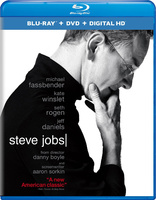
Movie rating
7.7 | / 10 |
Blu-ray rating
| Users | 4.5 | |
| Reviewer | 4.5 | |
| Overall | 4.5 |
Overview
Steve Jobs (2015)
His passion and ingenuity have been the driving force behind the digital age. However his drive to revolutionize technology was sacrificial. Ultimately it affected his family life and possibly his health. In this revealing film we explore the trials and triumphs of a modern day genius, Steven Paul Jobs.
Starring: Michael Fassbender, Kate Winslet, Seth Rogen, Jeff Daniels, Michael StuhlbargDirector: Danny Boyle
| Drama | Uncertain |
| Biography | Uncertain |
Specifications
Video
Video codec: MPEG-4 AVC
Video resolution: 1080p
Aspect ratio: 2.40:1
Original aspect ratio: 2.39:1
Audio
English: DTS-HD Master Audio 5.1
Spanish: DTS 5.1
French: DTS 5.1
Subtitles
English SDH, French, Spanish
Discs
50GB Blu-ray Disc
Two-disc set (1 BD, 1 DVD)
UV digital copy
DVD copy
Packaging
Slipcover in original pressing
Playback
Region A (B, C untested)
Review
Rating summary
| Movie | 5.0 | |
| Video | 4.5 | |
| Audio | 4.5 | |
| Extras | 4.0 | |
| Overall | 4.5 |
Steve Jobs Blu-ray Movie Review
Labor of love.
Reviewed by Martin Liebman February 3, 2016The biopic is a staple of the Hollywood landscape. Filmmakers love to rediscover and reintroduce interesting historical subjects through the lens of film, and often to excellent result. From Mozart to Gandhi, the breadth of history, the weight a name carries, and the skill of the top filmmakers to tell the life stories of the world's most famous figures in detailed, imaginative, and engaging fashion are, combined, practically without match in any other genre. A little more uncommon are subjects deemed worthy of multiple pictures over the years, those whose tales transcend a single moment on the cinema timeline and, with a revitalization on film, speak to new generations of audiences. That's a shorter list that includes individuals like Jesus, Joan of Arc, and Jobs, all of whom changed the world in their time, and beyond. It's the latter individual whose life is brought to extraordinarily rich and oftentimes moving detail in Steve Jobs, Director Danny Boyle's (Sunshine, Slumdog Millionaire) 2015 biopic that dwarfs the other Jobs film from 2013, both coincidentally from Universal Pictures. Boyle's film explores Jobs' personal and professional life evolution in visually disparate but tonally consistent and ever absorbing three-act fashion, each set against the backdrop of the tech industry legend's frantic preparations for key product introductions.
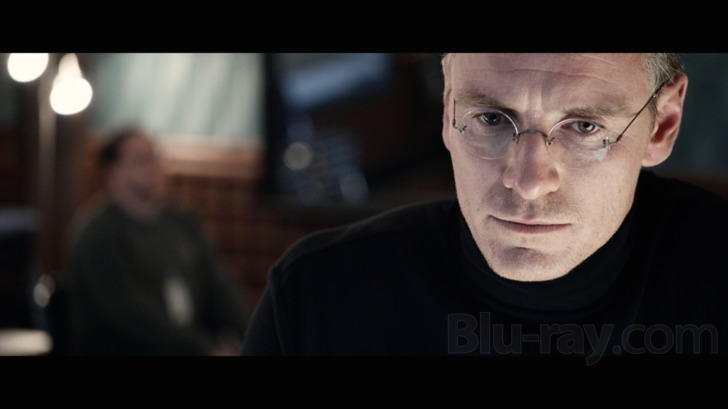
Steve Jobs, Act Three.
Steve Jobs isn't about technology, even as various products are featured and their introductions (the Macintosh, the Black Cube, the iMac), or discussions centered around them (the Apple II, the Newton, the iPod), play central to the story. Yet it's impossible to watch the movie without appreciating Jobs' role in developing and advancing not the nuts-and-bolts, circuits-and-motherboards side of computing, but the personal side, the way technology has so effortlessly integrated into modern society, not always for the greater good but to astounding convenience and, if the future holds the right cards, the betterment of mankind. The movie opens with a fascinating black-and-white clip that features Arthur C. Clarke describing, in surprisingly clear and visionary detail, the future integration of high technology into society. The movie transitions to Jobs and his team struggling to get the original Macintosh working to his exact specifications. It cannot say "hello" to the soon-to-be assembled audience (imagine what they would think if they could see the late Jobs' Apple now and products that don't simply regurgitate preprogrammed courtesies but can speak real-time weather, sporting scores, tell the user when Steve Jobs starts at the local cinema, or place a wireless call to a friend for a video chat, all from an item many times smaller than the original Macintosh's mouse). At the same time, Jobs can barely bring himself to say "hello" to his estranged girlfriend or his daughter Lisa, whom he cannot even acknowledge as his own.
From there, the movie begins a personal journey that starts with that 1984 introduction and follows on through to Jobs' departure from Apple and return to the company to make a big, industry-changing splash with the iMac's introduction in 1998. Boyle's three-act structure perfectly frames Jobs' life, hitting the career highlights of his prime while, more importantly, discovering the individual, through both his working relationships and, much more importantly to fleshing out the character, his relationship with his daughter. The movie's parallels between his immersion into work and technology and personal life are obvious, but never overwhelming. The "hello" dilemma that dominates the gritty opening act, the "Black Cube" middle -- which may as well have been labeled "black hole" instead, as both a metaphor for the machine and the man behind it -- and the more user-friendly, revolutionary, and world-changing iMac all perfectly reflect Jobs as a man beyond the confines of the technology that shapes his fortunes in business. The movie comes full circle in an extraordinarily touching final moment that both solidifies its dramatic arc and reaffirms Jobs' progress both in the technological world and in his personal life.
Boyle has crafted each of the three acts to tonally represent the time, the themes, and the technological and personal progress alike. He shoots the opening in gritty 16mm, when the technology was bulky and imperfect but promising of greater things to come. It also reflects Jobs' more cantankerous and controlling attitude both around his co-workers and with his family. Boyle transitions to a more refined 35mm shoot in the film's middle stretch and transitions to digital in its last, a final segment in which the technology, though hopelessly antiquated today, offered cleaner aesthetics and a more approachable user interface. But it also represented a cleaner character, too, an individual whose public persona, working relationships, and personal life are all on the rebound, reflective of a more organized, understanding man, understanding not only of the world around him but, more importantly, of himself. He admits his flaws and discovers who he is. It's amazingly assembled and complimentary of the film's unique structure and astounding writing that so effortlessly compiles all of its story arcs. What's even more fascinating is how the movie constructs its character so close to his public persona yet so far away from it. Jobs was best known for his on-stage presentations -- product introductions and "one more thing" proclamations to adoring fans -- but the film operates almost entirely behind that curtain, literally opening up the Steve Jobs few understood right against the backdrop of the Steve Jobs everyone knows. More, the film is dotted by several incredible performances. Michael Fassbender offers a career defining and remarkably transformative performance as Jobs, capturing not just a basic look but more importantly an essence of a man whose world is in a constant state of flux and whose ability to understand it all evolves from, literally, complicated algorithms that distance himself from his humanity to an appreciation and acknowledgement of life's smallest but most important treasures that remake him in the image of a man rather than the machines by which he's surrounded.
Steve Jobs Blu-ray Movie, Video Quality 
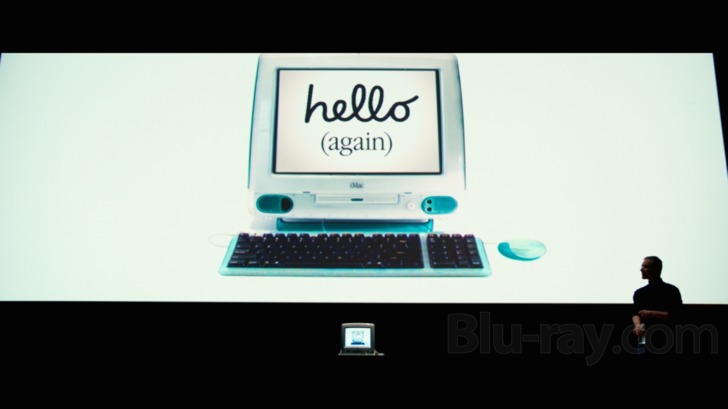
As mentioned above, Steve Jobs is the product of three distinct video sources: 16mm and 35mm film and digital video, all of which are, for the most part, evenly dispersed throughout the movie in three large segments. The opening 16mm act offers, obviously, the most visually raw experience of the three. Grain thickly permeates the frame and minor and infrequent speckles accompany. Details and clarity satisfy under the 16mm film's limitations, showing mildly soft but nevertheless well defined textures, largely on faces but also supporting background details and, of course, the bulky and beige computer hardware. Colors are mildly muted and less dense than they are later in the movie, but still satisfyingly rich and precise. The middle 35mm segment offers a more refined grain structure, sharper details, and more full, robust colors. Black levels in this segment are terrific, particularly evident when Jobs has a lengthy discussion with John Sculley that shifts around from time and place. The digital third act is, obviously, the cleanest and, arguably, the sharpest of the three. Facial details are intimate and refined. Colors are balanced and true. The visual variations certainly help the film's tonal presentation, and Blu-ray handles each unique flavor very well.
Steve Jobs Blu-ray Movie, Audio Quality 
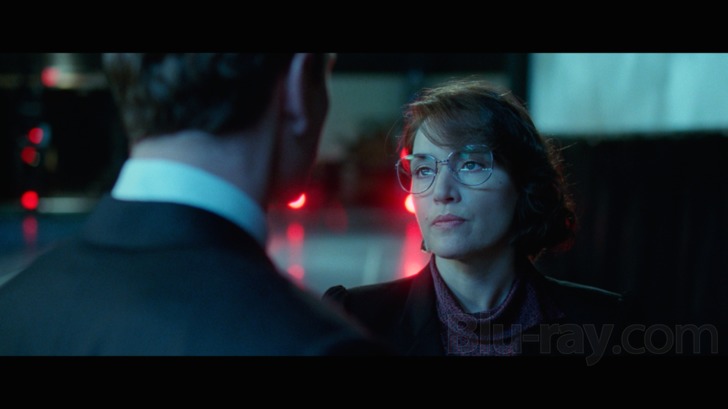
Steve Jobs features an all-around excellent DTS-HD Master Audio 5.1 lossless soundtrack. The film's opening segment is the most reserved of the three. Underlying electronic music pulses to good, weighty effect and increases in bass output later on. Mild environmental effects, like streamers blowing on an air conditioning vent, add a little nuance to otherwise dialogue heavy moments. Crowd noise falls a little flat but does offer a steady immersion. Crowd cheers become more pronounced later in the film, and stomps literally shake the foundation in the movie and recreate a steady, throbbing rumble in the home theater. Otherwise, the track is sparse in terms of wide ambient support or deep and detailed effects. Dialogue dominates and enjoys natural center placement, prioritization, and clarity.
Steve Jobs Blu-ray Movie, Special Features and Extras 
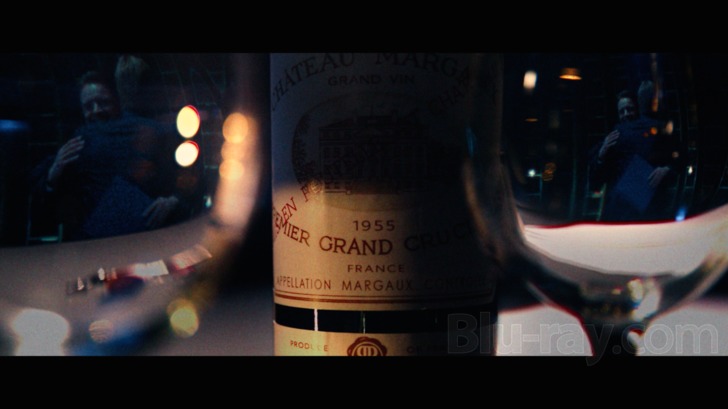
Steve Jobs contains a superb making-of documentary and two audio commentary tracks. For those on a time crunch the documentary is
insightful, filling, and fantastic, but the commentaries are well worth the added hours to hear them out. A DVD copy of the film and a voucher for a
UV digital
copy
are included with purchase.
- Inside Jobs: The Making of Steve Jobs (1080p, 44:11): A three-part feature. Part One (16:18) examines Fassbender's performance and the character he portrays, the script and the movie's structure, the Walter Isaacson book and the difference in approach between it and the film, the film's core conflicts, alterations from history, and Danny Boyle's direction. Part Two (14:50) explores some of the additional characters featured in the film -- John Sculley, Joanna Hoffman, Steve Wozniak -- and the cast that portrays them. Also explored is the importance of cast rehearsals. Lastly, Part Three (13:03) looks at shooting in real locations and many of the fascinating technical details of the shoot. Also explored is the film's music.
- Audio Commentary: Director Danny Boyle offers a terrific discussion of much of the same material described in the documentary, including shooting locations, the story and script, characters and performances, the technical details of the shoot, deleted scenes (which, sadly, do not appear on the disc, despite his wishes that they do), and more. Boyle manages to intermix straight recounting of the on-screen action with tremendous insight, both serious and light alike.
- Audio Commentary: Writer Aaron Sorkin and Editor Elliot Graham offer a great track that discusses the movie's introduction, audience engagement in the movie, the participants' own industry history, the details of the writing process and story structure, the editing process, and plenty more. There are many pauses in the track, but it's a solid listen and extremely informative.
Steve Jobs Blu-ray Movie, Overall Score and Recommendation 
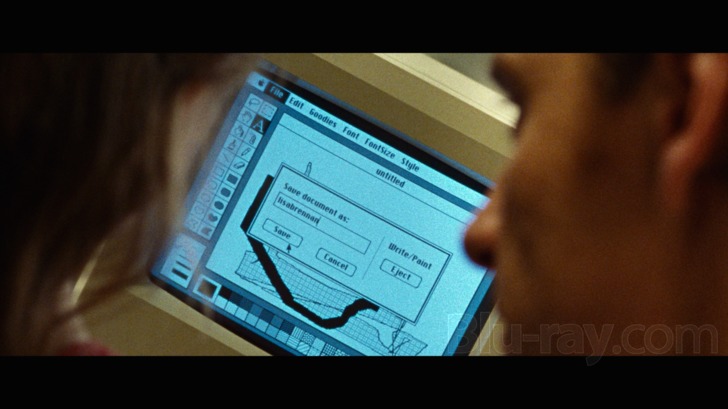
Steve Jobs is a remarkable film -- narratively, technically -- that doesn't just show the Steve Jobs who stood on stage, but explores him as the man behind it. Danny Boyle's direction and Michael Fassbender's performance are world-class, the former of which was painfully neglected at the recent Oscar announcements but the latter of which was rightly recognized with a Best Actor nomination. This is a wonderful work of art that should be remembered amongst the greats of Hollywood's many important and acclaimed biopics. Universal's Blu-ray release of Steve Jobs features stellar video, excellent audio, and several high quality supplements. Steve Jobs earns my highest recommendation.
Similar titles
Similar titles you might also like

Spotlight 4K
10th Anniversary Edition
2015

Jobs
2013

Fruitvale Station
2013

The Fifth Estate
2013

Colette
2018

Tesla
2020

Molly's Game
2017

The Social Network
Collector's Edition
2010

The Front Runner
2018

The Insider
1999

The Big Short
2015

The Theory of Everything
2014

Can You Ever Forgive Me?
2018

The Fighter
2010

J. Edgar
2011

Lovelace
2013

Dallas Buyers Club
2013

Grace of Monaco
2014

Christine
2016

Trumbo
2015
